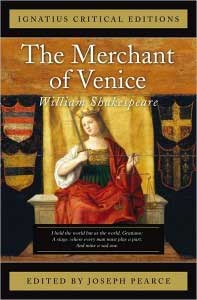Podcast: Play in new window | Download (Duration: 29:00 — 26.5MB) | Embed
Subscribe: Apple Podcasts | Spotify | Amazon Music | Android | Pandora | iHeartRadio | JioSaavn | Podchaser | Gaana | Podcast Index | Email | TuneIn | Deezer | Anghami | RSS | More
 Episode 11 – Great Works in Western Literature with Joseph Pearce – William Shakespeare part 2
Episode 11 – Great Works in Western Literature with Joseph Pearce – William Shakespeare part 2
The Merchant of Venice is probably the most controversial of all Shakespeare’s plays. It is also one of the least understood. Is it a comedy or a tragedy? What is the meaning behind the test of the caskets? Who is the real villain of the trial scene? Is Shylock simply vicious and venomous, or is he more sinned against than sinning?
 One of the most popular of Shakespeare’s plays, King Lear is also one of the most thought-provoking. The play turns on the practical ramifications of the words of Christ that we should render unto Caesar that which is Caesar’s, and unto God that which is God’s. When confronted with the demand that she should render unto Caesar that which is God’s, Cordelia chooses to “love and be silent”. As the play unfolds each of the principal characters learns wisdom through suffering.
One of the most popular of Shakespeare’s plays, King Lear is also one of the most thought-provoking. The play turns on the practical ramifications of the words of Christ that we should render unto Caesar that which is Caesar’s, and unto God that which is God’s. When confronted with the demand that she should render unto Caesar that which is God’s, Cordelia chooses to “love and be silent”. As the play unfolds each of the principal characters learns wisdom through suffering.
Based on the Ignatius Critical Edition, this series examines, from the Judeo-Christian perspective, the life, the times, and influence of authors of great works in literature .
Joseph Pearce is currently the Writer-in-Residence and Visiting Fellow at Thomas More College of Liberal Arts in Merrimack, New Hampshire. He is also Visiting Scholar at Mount Royal Academy in Sunapee, New Hampshire. He is also Visiting Scholar at Mount Royal Academy in Sunapee, New Hampshire. He is co-editor of the Saint Austin Review (or StAR), an international review of Christian culture, literature, and ideas published in England (Family Publications) and the United States (Sapientia Press). He is also the author of many books, including literary biographies of Solzhenitsyn, J. R. R. Tolkien, C. S. Lewis, G. K. Chesterton, and Oscar Wilde.
To learn more about the authors and titles available in the Ignatius Critical Editions




